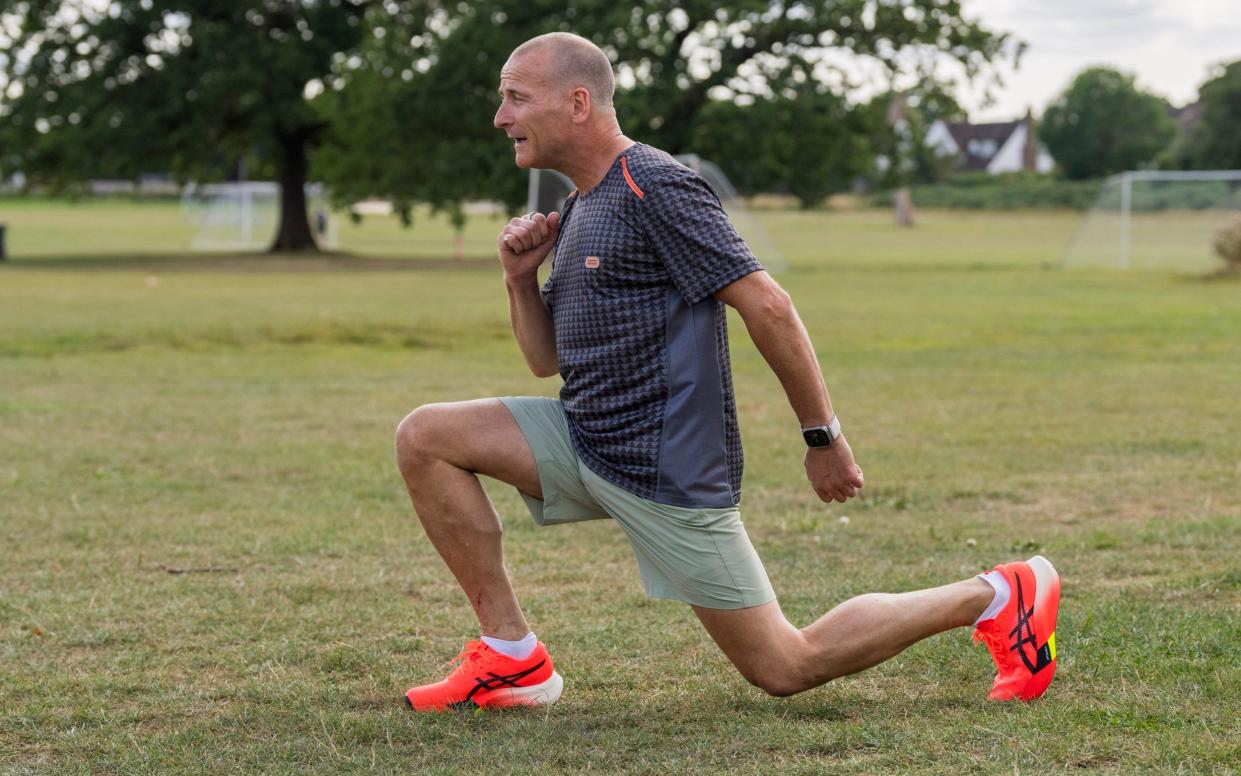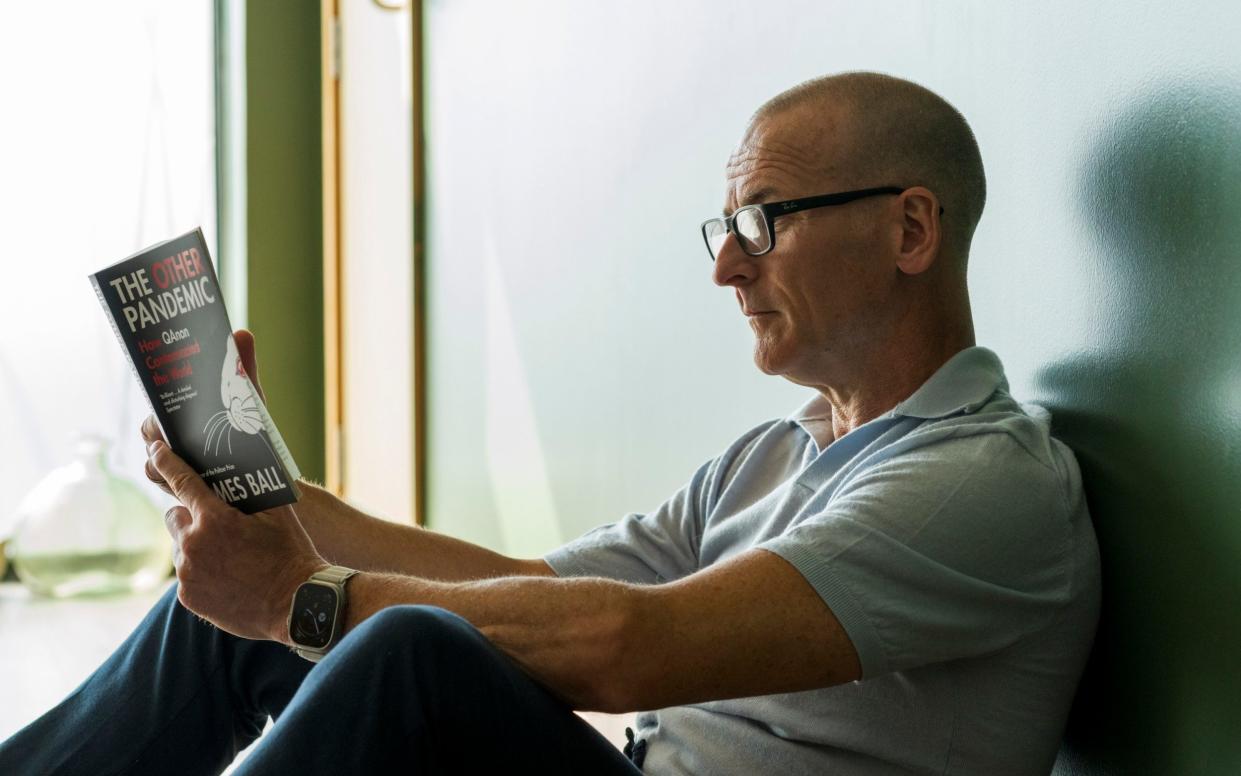What is the 75 Hard fitness challenge?

After the heavy hip-hop intro music, the angry shouty American man begins his one hour and 23 minute tirade. He is going to fix your brain and make you mentally tough. His name is Andy Frisella and, according to his website, he’s an entrepreneur, a podcaster, mentor, a “force for good” and a “certified dominator”, whatever that is. He has tattoos and a beard. He likes tight black T-shirts.
Frisella is the man behind the viral 75 Hard challenge, a strict 75-day military-style fitness programme combining exercise, diet and “mental resilience” that’s taken the internet by storm. He promises to transform you and make you a better person for free, apparently.
Normally, people like Frisella fade into the miasma of life coaches that floats across social media. But Frisella, who has 3.3 million Instagram followers, has managed to make a name for himself thanks to the hype around the 75 Hard challenge which as of May 2024, more than one million people from around the world have apparently completed.
You might be wise to approach the programme, and people like Frisella, with a healthy degree of scepticism, but if you’re the kind of person who, as he puts it, wants to “win, dominate and develop your own superpower,” this may be for you.
What exactly is the 75 Hard challenge?
“This is not a trendy fitness challenge,” shouts Frisella. Instead, it is a programme designed to develop “mental toughness”, which, for you or me, might mean being confident, having fortitude, grit, endurance, self-worth and self-control. He guarantees that if you complete it, “you will look back and say, ‘This is the greatest thing I ever did’”.
There are five “critical tasks” to the challenge:
1. Choose a diet and commit to it. There is no specified type of diet, but it must be a diet that will improve your physical health and challenge you.
If your goal is to lose weight, choose a diet designed for weight loss, such as a calorie-controlled diet. If you want to gain muscle, choose a high protein diet. The food needs to be “clean”, so you can’t eat a junk food diet, processed food or drink alcohol.
2. Drink one gallon (3.79 litres) of water a day. Frisella advises to be consistent throughout the day, rather than chug it all before bed.
3. Commit to two 45-minute workouts a day. One session must be outdoors. There are no stipulated workouts, other than they should improve your fitness. One could be a weightlifting session and the other an outdoor walk or jog.
4. Read 10 pages of a non-fiction book every day. “This is not Harry Potter time, this is learn new stuff time,” says Frisella.
5. Take a progress picture every day.
Rules of the 75 Hard challenge
If you compromise on anything, you have to start at the beginning. “If you do a 42-minute workout rather than a 45-minute workout you must start over from day one. If you read nine pages instead of 10 you must start again,” says Frisella.
No cheat meals. Eliminate all alcohol.
“It requires absolutely zero deviation, zero compromise,” says Frisella.
You can’t tweak the programme to your liking. It is supposed to be inconvenient and hard because, as Frisella says, “in life, conditions are never going to be perfect and you are always going to have to do things you don’t want to do”.
The workouts cannot be consecutive. “The reason for this is because it is supposed to be inconvenient,” explains Frisella.
The book has to be a self-development book for personal or professional growth. It could be about business or psychology. Audio or ebooks are not allowed. “The reason that it has to be a paper book is that there is a sense of accomplishment as you go through the book and see your progress,” says Frisella, who is clearly unfamiliar with Kindle progress indicator.

When taking your progress photo, wear clothes that show your progression. For men, that should be shorts and bare torsos. For women, a sports bra and some shorts.
Benefits
Those who have completed the 75 challenge and read 750 pages, changed their diet, walked for 90-minutes a day and taken photographs of their progress recorded the following benefits:
Detoxification
Weight loss
Improved fitness
Possibly habit forming
According to Frisella, it is the equivalent “of climbing Mount Everest for your brain”. “It is a huge accomplishment in your life that you can put in your mind as a trophy that you can always go back on to remind yourself how badass you really are,” he eulogises.
What are the drawbacks of the 75 Hard challenge?
Outdoor workouts do not consider inclement weather. In case of a hurricane or heatwave, Frisella advises: “Be smart, use your brain.”
It is impractical and does not allow for injury or illness.
It is time consuming.
No allowances are made for minor lapses.
Risks
Could lead to disordered eating, particularly for people who have a predisposition.
Injury risk from over-exertion with no rest days.

Expert opinion – is it right for you?
Stephanie Davies, a behavioural psychologist and the founder of consultancy Laughology, says: “Anything that gives someone help to change behaviour positively is not a bad thing, but the problem with these fads and short-term solutions is that people revert to what they were doing before.
“Often there needs to be wider changes to lifestyle and habits for long-term behaviour change to happen and be sustainable. There can be a range of outside influences that either incentivise behaviours or make people slip into old habits. The 75 Hard challenge does not address any external factors.
“The rule that if you fail you start at the beginning is demotivating and punishing. It creates unhelpful narratives about having a day off, or unperforming for any range of issues.”
Fraser Smith, a personal trainer and the founder of Vive Fitness says: “It is important to view 75 Hard as a personal challenge and nothing beyond this. It is militant by design, which is not going to appeal to everyone. It suits the extreme among us – think Iron Man and Marathon Des Sables.
“This is not to say that you won’t get results if you follow the programme to the letter, but it’s unlikely that you’ll make sustainable habitual changes for your long-term health. If you are looking to develop healthier sustainable habits, start by seeing if it can be enjoyable and start at a level suited to you. But an element of hard challenge or strictness every now and then can be a positive discipline, as long as it’s viewed as a challenge rather than a lifestyle.”
Priya Tew, a specialist dietician from Dietitian UK, says: “I know someone who did this challenge and came to me because they developed an eating disorder as a result. It throws up a lot of red flags – for example, over-exercising without rest days is not ideal.
“Rest is important for the body and there will be days when you are more tired or unwell. If you push yourself and punish your body during these times, it could have a detrimental effect on your health and your attitude to exercise, which should be enjoyable, particularly if the aim is to develop good habits. The 10 pages of a book is a good one. Drinking more water can also be beneficial, although a gallon a day may be too much for some people.
“We also know that generally diets don’t work. As an eating disorder specialist, I think that taking a picture every day is detrimental. It could encourage harmful self-criticism.
“Overall, if you soften the programme there are elements that could be beneficial, such as thinking more about eating healthier food, drinking more water, reading more, spending time outdoors. These are all good things, but the programme makes them strict and routine.”


